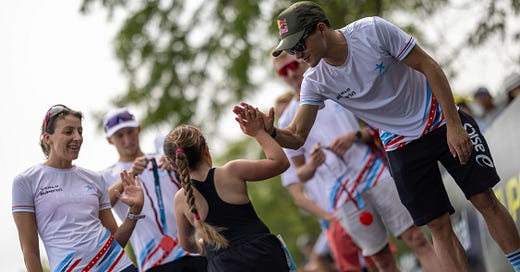Wrapping up my time in Boston and headed home for three whole weeks (!) before flying to Nice. Peak triathlon season is exhausting, isn’t it! Just imagine actually having to race it all.
Before I head out, I wanted to share with you all a few takeaways from the ground here at Supertri’s new season and rebranding (second branding?).
First off, Boston Tri is one of the larger grassroots local races I’ve seen in recent years — a few athletes told me it seemed bigger this year with all the people sticking around for the Supertri race after — but it’s also probably one of the most beginner races I’ve been to in awhile (with the exception maybe of college club races, which are always uber-newbie by definition but not lacking in confidence). There were questions I’d never even heard before (like concerns about having to wear a swim cap) and there were absolutely people riding whatever mountain bike they had in their garage. This is GOOD. This means these are completely new-to-triathlon athletes. So what’s happening to all these athletes between here and “becoming triathletes?”
Sub-point: Probably, if I had to guess, what’s happening is that a lot of the new athletes never think of themselves as triathletes. They think of themselves as people who run and bike sometimes and maybe ride a gravel fondo thing and go to Crossfit and do the Boston Tri. I don’t have an answer yet for what this means for our sport, but there’s a saying that ‘events create triathletes’ — by which we mean that most people will only do events that they can drive to or that their friends are doing or that are local. When those triathlons go away, those people stop doing triathlons and do other things that they can drive to or that their friends are doing. If Boston is creating all these athletes who right now do a triathlon, then it’s probably worth giving them other events too…
Subpoint #2: The West Coast tri ecosystem was demolished by COVID (and by the fact that nearly all those people have since moved on to other things: trails and gravel and camping and adventure rides). The East Coast tri system seems to have survived more robustly.
Supertri is fun. Way more fun to watch than other pro races — which, obviously, is simply a product of total race time and by design. It’s specifically designed to be fun to watch. And even though everyone always says that about crits, too, and looped courses, the reality is crits are goddamn boring to watch until the end because all you see is one second of action each lap and nothing else happens. Things *happen* in Supertri. (Sure, I think it’s probably more fun with the mini-break format; I think the 3x straight-through format might not be the most exciting, but still.)
Supertri is not easy to explain — but, once you elevator pitch explain it (which lots of people definitely needed), it’s way easier to get those people to stay and watch than other triathlons. Why? Because it’s short, it’s fun, and ‘Olympic gold medalist’ trumps everything; it 100% trumps ‘world champion.’ (Sorry.) Random people might not know what’s happening at Supertri, but they know that both the Olympic gold medalists were racing.
I was also relatively impressed with Supertri’s organization. Like, look, there are a lot of organizations in the tri space right now. And, of course the bigger ones are going to have larger legacy systems in place. But, in terms of the quality and level of product Supertri produces, particularly with respect to the amount of money spent v. revenue generated in terms of the proposed business plan, it’s pretty well organized. There was clear signage and instructions (for the most part), media zones, and coverage generated, multiple levels of team managers and schedules and VIPs. Were there things that could have been better organized? Sure! But, I still think if I was going to invest in something right now, the fundamentals of success here make the most sense.
The one thing that’s an open question: How does this new rebrand work out and will Supertri stick with this structure and model. They’re leaning heavily on teams moving forward, with more and more autonomy given to those teams and to team managers to do (and pay) as they see fit. Supertri certainly writes specific things into athlete contracts on a league level, but I think it might behoove them to maintain even more of a level of direct control. Just for an example: The U.S. team worked the kids race on Saturday morning and it was probably the hit of the weekend — these are the kinds of things that win over local communities and bring people back, and obviously on U.S. soil the U.S. athletes are gonna be a focus. But then the pro panel (which was, evidently, supposed to feature some of the other teams) was canceled at the last minute with no clear explanation and a handful of spectators who came to watch were left confused. Why? Because, and this may have been miscommunication, there was no incentive for that team manager to have those athletes stick around. This is ridiculous, of course, and these are things that should be required at a league level. Also, the athletes should have been required to bring their Olympic medals with them, ffs.




